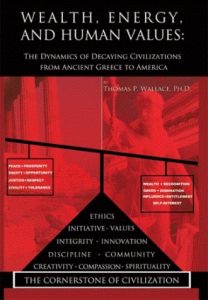 Arnold Toynbee points out that each mature civilization enjoys its era of socioeconomic prosperity but ultimately succumbs to “the mirage of immortality,” assuming that its good fortune will continue unabated forever. He also notes: “A society does not ever die ‘from natural causes,’ but always does from suicide or murder—and nearly always from the former.” Notably, history has never known a civilization that has avoided inevitable cultural breakdown, stagnation, and deterioration leading to ossification or collapse. And, the characteristics of the self-destructive exhaustion of past nation states has become quite visible in the first decade of the twenty-first century, as the world witnesses American society’s journey of cultural degradation.
Arnold Toynbee points out that each mature civilization enjoys its era of socioeconomic prosperity but ultimately succumbs to “the mirage of immortality,” assuming that its good fortune will continue unabated forever. He also notes: “A society does not ever die ‘from natural causes,’ but always does from suicide or murder—and nearly always from the former.” Notably, history has never known a civilization that has avoided inevitable cultural breakdown, stagnation, and deterioration leading to ossification or collapse. And, the characteristics of the self-destructive exhaustion of past nation states has become quite visible in the first decade of the twenty-first century, as the world witnesses American society’s journey of cultural degradation.
However, the civilization studies literature reveals a number of perplexing themes that have been the subject of continuing interest and debate among authors engaged in comparative historical and behavioral analysis of past civilizations. These topics include (a) the elusive underlying principles explaining the eventual disintegration of all known civilizations; (b) the basis for recurring sequential periodicity of civilization development; (c) the roles and significance of warfare and religion in civilization growth, decay, and rebirth; (d) the identification of inclusive, major variables influencing societal transitions; and (e) the significance of human behavior and cultural traits relative to the effective societal investment of national wealth in the successful development of socio-economic systems.
Yet, the mysteries surrounding the inevitable decline of civilizations become less mysterious if energy concepts, specifically thermodynamic principles, are appropriately applied to social, economic, and political processes. Specifically, the driving force of these processes of societal subsistence is energy, the availability of which, above all other variables, controls and restricts economic growth, stability, and prosperity as well as a society’s future viability. More generally, for nature, humankind, and other species of the animal kingdom, the processes of living and doing consist of mechanistic steps and sequences having energy requirements, a mechanistic-thermodynamic paradigm. That is, physical, chemical, and biological processes, for example photosynthesis, involve functional mechanisms that have energy requirements and are controlled by thermodynamic principles. Whereas, humankind’s social, economic, and political systems of existence are tainted by narcissistic individualism, religious ethno-cultural racism, aspirations of great wealth, and elevation to the pinnacle of the class and caste hierarchy. Such human flaws and limitations are the sources of societal degradation and the dynamics of decaying civilizations.
ORDER A COPY NOW

